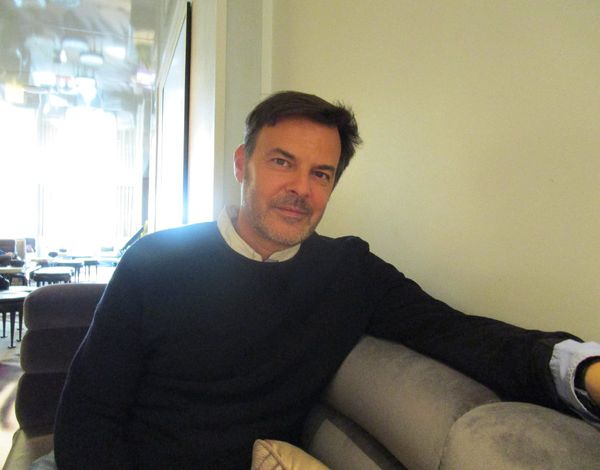By The Grace Of God (Grâce À Dieu), starring Melvil Poupaud, Denis Ménochet and Swann Arlaud with an impressive supporting cast including Aurélia Petit, Josiane Balasko, Éric Caravaca, Martine Erhel, François Marthouret, Bernard Verley, Amélie Daure, Hélène Vincent, Max Libert, Nicolas Bauwens, Zuri François, Timi-Joy Marbot, and Zéli Marbot, had its world première at the Berlin Film Festival, where it won the Silver Bear Grand Jury prize.
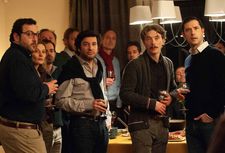 |
| François Debord (Denis Ménochet), Gilles Perret (Éric Caravaca), Emmanuel Thomassin (Swann Arlaud), and Alexandre Guérin (Melvil Poupaud) |
Whereas Tom McCarthy's Oscar-winning Spotlight focused on the journalistic tenaciousness of the reporters of the Boston Globe and its editor Marty Baron to expose the cover up of abuses by Catholic priests, By The Grace Of God takes on the challenge of telling the story of three men who struggle to bring their accounts forward.
The extraordinary structure of François Ozon's By The Grace Of God is based on real events. The film begins with Alexandre (Melvil Poupaud) living in Lyon. Happily married to Marie (Aurélia Petit), father of five, successful, he is the first to speak out about what happened to him as a boy at a church scout camp, after he discovers that the Catholic priest, Bernard Preynat (Bernard Verley) still works with children.
Following his journey, are those of François (Denis Ménochet), who will eventually become the founder of the association La Parole Libérée, and Emmanuel (Swann Arlaud), the youngest and the most vulnerable, who because of the statute of limitations at the time, plays an important part in bringing justice to the case.
The telling of three stories of three men in a row and leaving behind one for a while when the next story begins, until another one takes the narrative baton, works similar to the way how in ancient tales three brothers might venture out into the world to set things right.
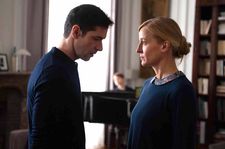 |
| François Ozon on Alexandre (Melvil Poupaud) with his wife Marie (Aurélia Petit): “I wanted to show that a victim of abuse is a ticking time bomb. It damages the whole family, everybody is touched.” |
François Ozon met with me at the Regency Hotel on Park Avenue the morning of the theatrical première in New York at Film Forum. This is the first instalment of our in-depth conversation on his film and the developing story with the real life characters.
Anne-Katrin Titze: You made a very important film.
François Ozon: It's complex. I don't know. I hope so.
AKT: I think so. Was there a decisive moment for you when you knew that you could make this film? When you knew how to structure it? Because the structure is so interesting in itself.
FO: Yes. I think the structure comes from the reality. When I discovered the testimonies on the Net, I realised Alexandre was the first one, who began the fight. So I decided to meet him and I thought he was very interesting as a character, because he's very Catholic. He believed in the institution, he trusted Cardinal Barbarin. So it was interesting to meet him. When he came he came with a big folder with all the exchanges he had with the church and he said to me "Do what you want with that."
And it was amazing material for me as a director. And my first idea was to make a play. Because all these exchanges were crazy. But I realised making a kind of investigation, that the fight continued beyond him. There was a kind of relay race between different characters. I discovered François was very important, he created the association La Parole Libérée. And afterwards many other victims came out.
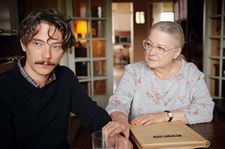 |
| François Ozon on Emmanuel (Swann Arlaud) with his mother Irène (Josiane Balasko): “I met him and he was very powerful, very human, and I realise was perfect for the third character.” |
So I realised my story was more important than just Alexandre. So I decided to make this kind of relay race between these three characters. With Alexandre and François it was obvious to have those two because they were very important in the story of the association. And for the third one I had the choice. Alas, because there are about 70 victims.
AKT: 70 victims over thirty years, approximately?
FO: Yes.
AKT: Who came forward?
FO: Who came out. Because many people never talked. So I had the choice for the third character and I asked François and Alexandre, "Can you help me? Can you advise me?" It was a kind of casting. I wanted something not with the same social background.
Maybe someone who was not about to have a family, to have a job. More suffering than them, apparently. They told me "You have to meet Emmanuel." I met him and he was very powerful, very human, and I realised was perfect for the third character.
AKT: It's interesting that you call it a relay race, because you do really give them each their time. You do not jump back and forth.
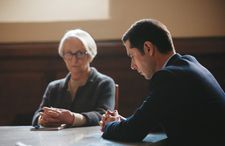 |
| François Ozon on Régine Maire (Martine Erhel) with Alexandre (Melvil Poupaud): “She is part of the institution. But she thinks she does her best.” |
FO: No, it's chronologic. My producers were very nervous about that. They said to me "Can you not mix everybody from the start?" I knew it was a challenge, because usually you don't lose a character after 45 minutes. Except maybe in Psycho of Hitchcock.
AKT: Exactly!
FO: But it's not for the same reasons. It was a challenge but that's what excited me. Actually I tried to think if there's a film with a structure like that. And I didn't find it. I had more in mind some series. Sometimes in a series you have one character …
AKT: … and then it moves on to another one. A person who left a strong impact on me was Régine Maire. Already that name of all things.
FO: It's her real name.
AKT: She is not exactly as motherly as her name sounds phonetically.
FO: I had many problems with her because I used her real name. Barbarin, Preynat and Régine Maire - it's the real names. I had some problems with that because they took me to court. And they tried to stop the release. But thankfully the justice decided in the case of this film that the freedom of expression was more important than the presumption of innocence.
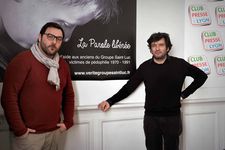 |
| Denis Ménochet and Éric Caravaca in front of a La Parole Libérée poster: “I discovered François was very important, he created the association …” |
And actually, Régine Maire, you can see what you want about her. Some people think she's a bitch and some other people think that she does her job. Warm, I don't know, but she tried to help the victims in her way. Everyone has their own reasons.
AKT: She seems so perfectly corporate.
FO: Yes.
AKT: She has this attitude of: This is what we do. Now we pray. Now we say thank you. Which is chilling.
FO: She is part of the institution. But she thinks she does her best. I think now she has understood it was maybe a mistake. And now they have stopped this kind of confrontation they organised before between the paedophile and the victim. Which is a terrible idea. When you speak with psychologists they say you don't have to do that, it's a mistake. You do that with the justice, with the policeman, or in front of a judge but not within the church.
AKT: Things are still undecided? There's still a trial coming up for the priest, Preynat, early next year, no?
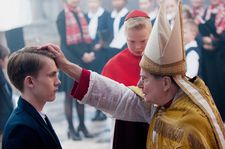 |
| Cardinal Barbarin (François Marthouret) with Alexandre and Marie’s son Gauthier (Max Libert) |
FO: The priest will be judged but after the release of the film he was defrocked by the church. Which is a big victory for the survivors. Barbarin was condemned and he is appealing the sentence. So we know at the end of the year.
And you know, the big thing with Barbarin, after his condemnation he went to the Vatican to see Pope Francis and to give his resignation. And the Pope refused it. So it was again a big scandal. Because the Pope doesn't stop to say zero tolerance for paedophilia. And when he has to act he doesn't do what he says. So it's again a big scandal in France.
AKT: I was impressed by how much you included the families, the impact on everybody. The parents who reacted so differently. Some of the victims were believed by their parents, others weren't.
FO: Yes, it's really the subject of my film. I wanted to show that a victim of abuse is a ticking time bomb. It damages the whole family, everybody is touched. The parents of course, because they feel guilty, the brothers, sisters, the children. When a child is abused everybody is affected by the abuse. It was for me very interesting to show that because I didn't know before. I discovered that doing my investigation.
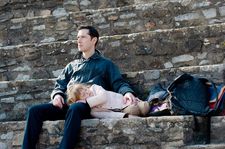 |
| Lila (Zéli Marbot) with her father Alexandre (Melvil Poupaud) |
AKT: Cinematically, there were a few times in the film - say, when they are on the icy road or Emmanuel is on the motorcycle - where I felt a kind of danger. Anything could happen to them at any moment which I thought maybe mirrors the sense of danger they might feel because of what they are doing by speaking out. So you were putting this into the physicalness?
FO: That's what I felt when I met them. When I met Emmanuel he was so fragile and strong at the same time. When he told me all his stories; the story with his girlfriend, the story with his penis, it was so moving, shocking, and dangerous at the same time. And when he told me "You know, for a long time, I wanted to kill the priest" and I knew he could have done it. So all these feelings, I used it in the script.
AKT: And still you managed to have humour in there, which is really quite amazing.
FO: It's black humour. But they got black humour. Especially François. We need that.
AKT: The bakery scene. Buying a "religieuse" [a pastry; the subtitles called it "nun cake"].
FO: You know, we need a kind of distance, especially people working in the association. They spend their time listening to victims telling them about the abuse. Sometimes they are tired of that and want to make jokes.
By The Grace Of God is at Film Forum in New York and opens in the UK on October 25.








